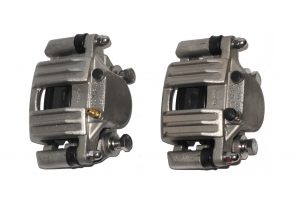Boat trailer maintenance Part 2
Blog | September 23rd, 2019Part two of our Boat trailer maintenance article will continue where we left off and covers;
Suspension, axles, electrical and more.
Suspension and axles
Leaf spring suspension has been around for many decades and remains a highly popular boat trailer option because of its simplicity and reliability. As with other trailer components, suspension can corrode. Rusted leaf springs on their way out will begin to spread and lose their integrity. Note that some superficial rust is to be expected, so don’t freak out just yet. Cracks and chunks coming off, however, are cause for concern, particularly if this is evident on the U-bolts.
Rubber torsion suspension systems tend to be more sophisticated. Again, they are subject to corrosion like any other trailer component. The precise maintenance routine depends on the manufacturer.
In all cases, a harder ride is a sign that the suspension needs your attention.
Check brakes
Brakes are one of the more important parts of a trailer, yet they also require the most maintenance. Not only are they constantly subjected to high stress when in use but they are also routinely immersed in salt water.
The degree of maintenance depends on the nature of your boat. For example, loads (i.e. an Aggregate Trailer Mass, also known as the ATM) under 750kg do not require an independent braking system, whereas an ATM exceeding 2000kg requires an independent power and breakaway unit.
Lubricate all components including the brake lock tab and hitch actuator. Check the discs and calipers for corrosion and wear. Thankfully, brake pads are cheap and easy to replace. Uneven patterns on the rotor strongly suggests the brake is not functioning as required. Also inspect the brake-cables or brake fluid. It is not unusual for cables to require occasional adjusting and remember that fluid does need replacing.
Test the lights and wiring
Electrical faults on a boat trailer can be troublesome because the root cause can be difficult to isolate.
Start by ensuring all lights work. A plug testing kit is a great way to isolate problems, as you can quickly determine whether the fault is limited to the trailer. Dirty connector plugs should be cleaned (use an electrical contact cleaner). Check the ground wire for corrosion or fraying, as it’s common source of problems.
If you have an older trailer, strongly consider upgrading the lights to LEDs (but don’t mix LEDs with incandescents). This is also a perfect time to thoroughly inspect all wiring, which again can be subject to corrosion.
Check the winch and straps
A broken winch strap is never fun, particularly if it snaps on the ramp during retrieval.
Lubricate the gears, and check the tie-downs, shackles and chain. Winch straps and tie-downs are notorious for degrading and eventually breaking as a result of prolonged sun exposure. Discolouration is a sign that the material has sustained some UV damage.
While you’re at it, pull out a decent length of cable or strap and check for fraying or other deterioration.
Finally
Secure your boat, regardless of whether it’s for winter or the weekend. Avoid storing easily stolen items like fishing gear, electronics and flares in the boat. Many anti-theft devices like trailer locks and wheel clamps are available, as are high-tech GPS and microdot options — but hopefully, by applying common sense, you won’t have to resort to using them in the first place.
Most importantly, have fun and be safe on the water.
If you need your boat trailer serviced or repaired Sales Trailers on (02) 9533 3652

